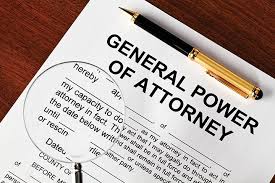Introduction:
In the intricate landscape of legal terminologies, the General Power of Attorney (GPOA) stands as a powerful instrument, allowing individuals to confer broad authority to another person to act on their behalf. This legal document is a cornerstone in the realm of personal and financial decision-making in the United States, providing a nuanced framework for individuals to navigate the complexities of delegation. We should dig into the complexities of the General Power of Attorney in the USA, disentangling its importance, degree, and suggestions.
Defining the General Power of Attorney:
The General Power of Attorney is a legal document that grants an appointed agent, often referred to as an attorney-in-fact or agent, the authority to act on behalf of the principal (the person granting the power). This authority is expansive, covering a wide range of financial, legal, and business matters. Unlike a Limited Power of Attorney, which restricts the agent's authority to specific tasks or time periods, the General Power of Attorney is comprehensive and enduring unless revoked or terminated.
Scope of Authority:
One of the unmistakable elements of a General Power of Attorney is its expansiveness of power. The document empowers the agent to make decisions and take actions on behalf of the principal in various domains, including but not limited to:
Financial Matters:
The agent can manage bank accounts, handle investments, pay bills, and conduct other financial transactions.
Real Estate Transactions:
The agent may buy, sell, or manage real estate on behalf of the principal.
Legal Affairs:
The agent can engage in legal proceedings, sign legal documents, and represent the principal in legal matters.
Business Transactions:
If the principal owns a business, the agent can make business-related decisions and transactions.
Healthcare Decisions (if specified):
In some cases, a General Power of Attorney may include authority over healthcare decisions, although healthcare matters are typically covered by a separate document known as a Healthcare Power of Attorney.
Execution and Revocation:
Making a General Legal authority requires cautious thought and adherence to state-explicit guidelines. The supervisor should be of sound psyche and ready for figuring out the ramifications of allowing such power. The report should be marked, saw, and authenticated to be legitimately substantial.
Revoking a General Power of Attorney is equally important. It can be done at any time, as long as the principal is mentally competent. A written revocation document should be prepared, signed, and distributed to all relevant parties.
Considerations and Caution:
While the General Power of Attorney is a powerful tool for delegation, it is not without risks. Granting someone broad authority demands a high level of trust in the chosen agent. To mitigate potential misuse, individuals should carefully select their agents, clearly outline the scope of authority, and periodically review and update the document as circumstances change.
Conclusion: General Power of Attorney
The General Power of Attorney in the USA fills in as a key real framework, offering individuals versatility and control their own and money related endeavors. In the intricate dance of delegation and responsibility, this document stands as a testament to the importance of informed decision-making and trust within the realms of personal and financial stewardship. As individuals navigate the complexities of life, the General Power of Attorney serves as a guiding light, illuminating the path to responsible and judicious delegation.
General Power of Attorney in the USA: Frequently Asked Questions:
What is a General Power of Attorney (GPOA)?
A General Power of Attorney is a legal document that grants broad authority to an appointed agent (attorney-in-fact) to act on behalf of the principal in various personal, financial, and legal matters.
What authority does a General Power of Attorney confer?
The authority granted by a GPOA is extensive, covering areas such as financial transactions, real estate management, legal representation, business decisions, and, in some cases, healthcare matters.
How is a General Power of Attorney different from a Limited Power of Attorney?
While a General Power of Attorney provides comprehensive authority, a Limited Power of Attorney restricts the agent's powers to specific tasks or time periods.
When does a General Power of Attorney take effect?
A GPOA typically takes effect immediately upon execution unless specified otherwise in the document. However, it can also be drafted to become effective only under certain circumstances, such as the principal's incapacity.
How is a General Power of Attorney executed?
To be legally valid, a GPOA must be in writing, signed by the principal, witnessed, and notarized. The particular prerequisites might differ by state.
What is the duration of a General Power of Attorney?
A General Power of Attorney can be enduring, meaning it remains in effect even if the principal becomes incapacitated, or it can have a specified duration. The principal can also include conditions for termination or revocation.
Can the authority granted by a General Power of Attorney be modified?
Yes, the principal can modify the authority granted by a GPOA at any time, as long as they are mentally competent. This may involve adding or removing specific powers, changing the designated agent, or altering other terms of the document.
Can a General Power of Attorney be used for healthcare decisions?
While a GPOA primarily addresses financial and legal matters, some documents may include authority over healthcare decisions. However, healthcare matters are typically addressed in a separate Healthcare Power of Attorney.
Can a General Power of Attorney be revoked?
Yes, a GPOA can be revoked at any time by the principal as long as they are mentally competent. A composed disavowal report ought to be ready, marked, and dispersed to significant gatherings.
What precautions should individuals take when creating a General Power of Attorney?
Individuals should carefully select a trustworthy agent, clearly define the scope of authority, and regularly review and update the document to reflect changes in circumstances. Seeking legal advice during the creation process is advisable.









0 Comments